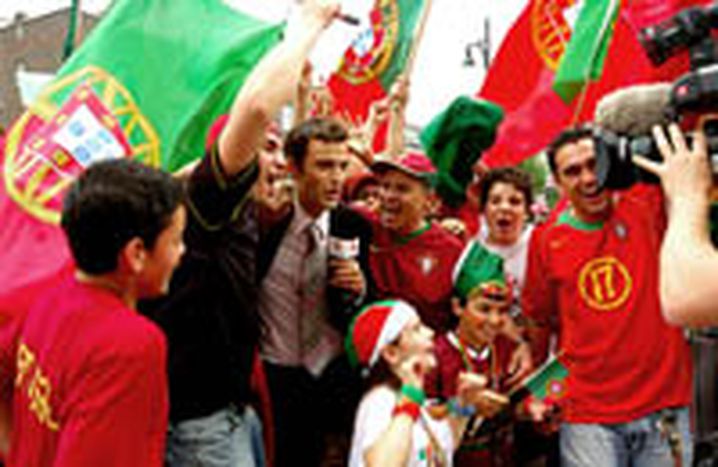
A delicate balancing act
Published on
Translation by:
 katy waterman
katy waterman
Sports journalists often report live from events and remain particularly loyal to those they interview, perhaps too loyal. In Germany there are increasing calls for sports journalists to be more critical
Professional footballers like Michael Ballack, Miroslav Klose and Lukas Podolski are the stars of German football. They are portrayed as more than just sportsmen. With their own fan clubs and PR advisors, these footballers have taken their place in the celebrity pantheon. The activities of footballer’s wives are just as interesting for the media as what happens on the field. Melanie Slade, the 17 year old girlfriend of Theo Walcott, a surprise call up for the England World Cup squad, became an instant celebrity, posing as a model for an English tabloid.
But it is the footballers as much as the wives who grab the limelight. Once the final whistle has blown, journalists wait, crammed together, in the so-called “Mixed Zone” – the area between the press room and the players’ changing rooms. There, they try to get a few words from the players before they watch them disappear into the showers. Whilst the radio reporter holds his microphone in front of the star midfielder, his colleague from the local press busily jots down notes. Often the response goes something like “admittedly, we didn’t play that well and we suffered because of it.”
“Those who dare to criticise the players often don’t get to ask any questions at the next match,” admitted Wolfgang Uhrig, the long-time editor-in-chief at Kicker magazine, at this year’s award ceremony for the Stegmann Prize for Sports Journalism. Some reporters build up a personal network of important contacts in order to get stories. But Uhrig criticises this aspect of his profession, “As a result, journalists run the risk of becoming dependent on these contacts – something which, unfortunately, I have witnessed far too often.”
“Quality not Quantity”
To counteract such dependency, the initiative Sportnetzwerk [sports network] was set up. In January 2006, 24 sports editors, most of them from national daily papers, withdrew from the Federation of German Sports Journalists (VDS). The sports editors did not feel that their calls for a more critical style of journalism were sufficiently represented by the union. Through Sportnetzwerk they hope to raise the standard of quality in sports journalism. “The fact that many journalists would rather write for PR purposes than improve the quality of sports journalism is extremely worrying” is an extract from an open letter they wrote to the VDS. Members of the network are, amongst others, Thomas Kistner from the German newspaper Süddeutsche Zeitung, Jens Weinrich, sports editor at the Berliner Zeitung, and Michael Gernandt, who has been head of the sports section at Süddeutsche Zeitung for over 20 years.
“We’re all in the same boat”
Gernandt has also noticed that some reporters have been trying to get pally with the players at the World Cup. At the press conferences, it’s easy to see those who address the players formally, such as “Mr Klose. . .” and those who address them informally, such as “So, Miro. . .” “At the end of the day” he says, “we’re all in the same boat. Your opportunities are minimised if you’re critical and thus you become dependent. Freedom of speech is being forfeited.” He has observed that, above all, it’s the journalists working for the tabloids and TV broadcasters who don’t want to be critical. But through their actions, these are the reporters who are devaluing “sports journalism.” In comparison to other journalists, the loyalty demonstrated by sports journalists is often particularly obvious. “Journalists working in politics and economics aren’t on a first-name basis with the MPs they interview” explains Michael Gernandt.
“Unspeakable Collaborations”
Jens Weinrich, one of the founding members of Sportnetzwerk also openly criticises the TV coverage of the World Cup. Only the live reports still satisfy journalistic standards of quality. The trappings however, have nothing to do with journalism. The expert at the studios of the German broadcaster ARD, Günter Netzer, is also dealing with the World Cup rights. Franz Beckenbauer maintains private sponsorship contracts with companies who are also sponsoring the World Cup. The fact that both these former national football players provide commentary on terrestrial TV for international matches has been branded an unspeakable collaboration by Weinrich.
Jubilant World Cup Atmosphere
Sportnetzwerk grew to 300 members within a few weeks of it being set up. Experienced journalists pass on their knowledge to younger reporters through organised workshops and conferences. In May, the network published the book Korruption im Sport [corruption in sport]. Founding member Michael Gernandt wants to continue campaigning for “critical analysis in place of cheap propaganda.” Journalists should not let themselves get swept up in the jubilation of the World Cup in Germany. “Otherwise they’ll lose their ability to write critically,” he warns. On the other hand, they do need to convey the World Cup atmosphere in their articles. “For some newspapers this will be a delicate balancing act.”
Translated from Ritt auf der Rasierklinge


